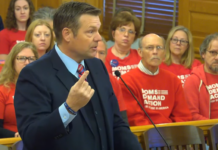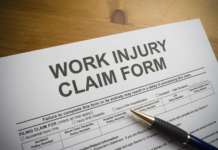A Senate committee on Monday withdrew a proposal that would refund property taxes to businesses facing competition from state and local governments.
The Senate tax committee withdrew the measure from a bill giving property tax rebates to some businesses that suffered financial losses during the pandemic.
Instead, the committee voted to direct legislative auditors to study the impact of governments and nonprofit businesses competing against for-profit businesses.
The bill, which will be considered by the full Senate on Tuesday, would require the final report to be completed by Jan. 15, 2022.
“This issue has been around for years. It’s not new,” said Republican state Sen. Caryn Tyson, chair of the Senate tax committee.
Tyson said in an interview that lawmakers need more research and data before moving ahead with the type of proposal that first surfaced last month.
“It will give us a better picture of where we go from here,” she said.

“We hope to demonstrate that we have government entities competing against for-profit businesses so we need to establish a concrete structure of defining what a business is,” Tyson said.
Democratic state Sen. Tom Holland, the ranking minority member on the tax committee, said he hoped the audit would help define the issue better.
“You start talking about government competing wth the private sector. What does that really mean?”Holland asked.

“I think what the audit will get us into is showing the different businesses situations that are out there with some ability to quantify how big that is.”
The issue over government competition with the private sector bubbled up earlier this session with for-proft fitness centers seeking a property tax exemption.
The gym owners, including Wichita’s Rodney Steven, argued they have to compete against gyms operated by local governments and nonprofits such as YMCAs that are hurting their bottom line.
Steven, a frequent campaign contributor of legislative campaigns, tried something similar about eight years ago when he sought to tax YMCAs but failed.
The audit was attached to legislation that would give property tax rebates to some businesses with yearly revenues between $10,000 and $2.5 million that did not receive more than $150,000 in federal COVID-19 relief aid.
The businesses would have had to be operating between July 1, 2019, and March 1, 2020. They would have had to file a 2019 tax return with less gross revenue in 2020 or 2021 than in 2019.
Holland and Republican Sen. Mark Steffen sponsored the underlying bill, which targets relief for businesses that were shut down or had their operations restricted during the pandemic.
Their bill excludes a number of businesses such as grocery stores, retail liquor stores, professional services, hospitals and most healthcare providers, property management and real estate services as well as telecommunication companies, among others.
The rebate amount would be capped at $7,500 with the counties responsible for picking up a third of the cost of all claims made for relief.
The state would pick up the remaining two-thirds of the cost of the claims.
Estimates indicated that claims could total $44.3 million for tax year 2020 with the state responsible for $29.7 million and the counties responsible for $14.6 million.
For tax year 2021, claims are anticipated to total $24.8 million, with the state being responsible for $16.6 million and county governments being responsible for $8.2 million.
Republican Sen. Molly Baumgardner of Louisburg asked how the rebate bill conflicts with separate legislation that would use COVID-19 relief money to compensate busineses that suffered losses during the pandemic.
Democratic state Sen. Ethan Corson of Prairie Village said he thought the two bills were different, one is more directed at property taxes while the other bill considered in a separate committe is more focused on lost profits.
“I don’t know that it’s one or the other,” Corson said.















